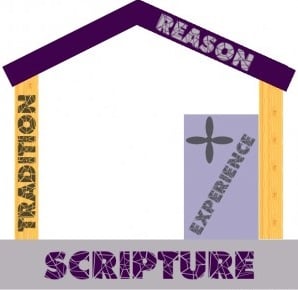We’re discussing how we build what we know about God, our theology, and using Wesley’s Quadrilateral as an outline for our discussion. The first of the four I want to discuss is Tradition. I think I want to start with that one because it’s probably the one that, for me, growing up largely in a low-church environment, is the most “undiscovered country” of the four. Even this series is evidence of the growing value that Tradition has for me as I follow Christ day by day.
Our questions on Tradition are these: Who makes up your community? Who are “your people?” Think along both descriptive and prescriptive lines; what groups, cultures, traditions (in and out of church) actually shape your theology, and who should, or who do you want to shape it? Do you focus on voices of a certain denomination, hemisphere, culture or time period? In what ways to you want to broaden or narrow the Traditions or communities you call home? What are some ways that a community or Tradition opened your eyes to an aspect of God you treasure today? What are some ways a tradition or community has blinded you to truths you now hold dear? Did you ever have to step outside of your tradition into the larger Tradition to find language or counsel for something you were experiencing or learning?
I should note that I posted on Tradition here not too long ago, and I’d also like to mention that the United Methodist Church has some great material on their site on each part of the Quadrilateral as they still use it today. In fact the opening paragraph there introduces the concept of Tradition well:
“Between
the New Testament age and our own era stand countless witnesses on whom we rely
in our theological journey. Through their words in creed, hymn, discourse, and
prayer, through their music and art, through their courageous deeds, we
discover Christian insight by which our study of the Bible is illuminated. This
living tradition comes from many ages and many cultures. Even today Christians
living in far different circumstances from our own–in Africa, in Latin America,
in Asia–are helping us discover fresh understanding of the Gospel’s power.”
That
intro brings me to what I think is something of a misnomer here. It is not, to me, so much a matter of
‘Tradition’ as it is community with all
the saints. If we Christians
today believe that God is alive and well and active in us, then we are hard
pressed to think less of the many who have come before us, who, I believe, now
anticipate full, face to face fellowship with us along with Christ.
The
question of who will we become and what we will believe is, in my opinion, significantly
determined in actual fact by the prior question of who will we make “our
people.” I’m not talking here
about to whom we will show love or hospitality. That should be universal. I’m talking about which people group grounds us and our
sense of reality. Whose norms to
want to make our own? Whose wisdom
to we open our ears to hear? To
whom to we go for counsel in the Way?
For my part, I want John Wesley to be a norm-setter for me, along with
Andrew Murray, St. John of the Cross, the apostle Paul, Mother Teresa,
Kierkegaard, Martin Luther (and the King, Jr.), along with hosts of Quakers,
Catholics, Southern Baptists, Vineyard folks, Anabaptists, Anglicans and even
anonymous recovering alcoholics and others besides. To those whose lives demonstrate an obvious wisdom and fear
of the Lord and the nature of his Spirit, I often affirm, “This is my
community.” But I admit, as
well, that many of my own compromises and failures have come from being
unwilling to be ostracized from or give up status within other communities and
traditions of thinking and acting. Community and Tradition, like Reason and Experience, are
doors that swing both ways, for good ideas and bad ones.
And of
course, thankfully, not all the saints are present with Christ. Many are right here in this world,
fighting the good fight, or not, right next door, often available to encourage,
advise and even hear my confessions and theology in the making. Our local church traditions and
connections are hugely important to our own theological conclusions. And it’s not just church, but family,
friends, and work relationships and patterns that form the Tradition that
influences us. Venues such as this
blog demonstrate how much we all long to wrestle with our faith not only one
our own but with others, particularly those who are also seeing and responding
to Christ, sometimes piece by piece.
But our local traditions and churches are anything but intellectual
interactions alone. Love, in deed
not merely words, for one another is the central command and example of our
Father and our Lord. It is the
mark of being Christ’s disciple, and the fruit of his Spirit within us. Even the model prayer Christ gives us
is to be done together, as we pray “Our Father . . .” How we see the faith implemented and
embodied, how we receive the grace of God communally and individually and
believe it to be most powerfully communicated and embodied, these are all part
of the Tradition that builds our ideas about God.

